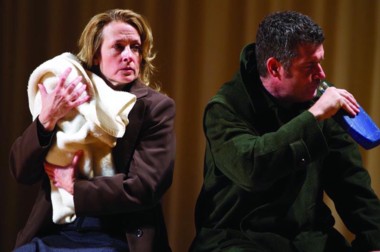Once upon a time in the not too distant past, Northampton was anything but a bastion of liberalism. A century before Calvin Coolidge was mayor–two centuries before the town’s lesbians outnumbered its Republicans–Northampton was the site of a public execution. As recounted in Michael C. White’s historical novel, The Garden of Martyrs, more than 20,000 God-fearing folk flocked to town in June, 1806 to cheer the execution of two Irish Catholic laborers, Dominic Daley and James Halligan.
What the spectators did not know, but Father Cheverus, the Catholic priest who was summoned to Northampton to minister to the men, had already learned, was that Daley and Halligan were innocent of the murder for which they were condemned. The judgment against them was hasty, the verdict determined as much by hatred and suspicion of the state’s Irish Catholic minority as anything else.
Jump ahead 204 years. When composer Eric Sawyer, who teaches at Amherst College, received a copy of White’s novel from tenor Alan Schneider, he immediately seized upon the story’s operatic dimensions. Within a year, he and translator/theater historian/playwright/dramaturg Harley Erdman, professor of theater at UMass Amherst, had not only worked out the scenario for an opera based on the novel, but also had libretto and piano score in hand.
Sawyer and Erdman determined to use, as much as possible, regional singers; to work with a chamber ensemble of the Springfield Symphony, whose home is down the road from where the murder was committed in Wilbraham; and to stage the performance at Northampton’s Academy of Music, close to where a lot of the action took place. By the time they had publicly workshopped the opera’s second act, they had brought on board the Springfield Symphony’s music director, Kevin Rhodes. The result of the three men’s collaboration, the operatic version of The Garden of Martyrs, premieres on September 20 and 22 at the Academy of Music.
“The action is focused around Father Cheverus,” says Erdman. “A major change takes place within him as he arrives from Boston to save some souls for Christ. Once he discovers that they’re innocent, he undergoes a personal transformation that includes facing his own cowardice in the past.”
We don’t know what Cheverus actually said at the execution, because both his unrecorded oration and many other events in White’s novel and the opera are fictionalized. But we do know that the priest’s words had a very profound effect on the people who witnessed the execution.
“They actually felt themselves admonished in some way, and were silenced,” says Erdman. “Cheverus went on to become a bishop and a very respected, important, powerful moral figure in early Massachusetts. The execution thus became a turning point in the state, not only for the Catholic Church’s position, but also for the tolerance of other religious viewpoints.”
Translating such a multi-dimensional story into a viable opera, of course, is a challenge. “It’s great piece of theater,” says Rhodes reassuringly. “The main characters have been very well carved out, both in terms of words and the way the music works with them. Harley’s text is so compact and to the point, and Eric’s musical language is so direct and understandable. We’re not dealing with certain complexities that you’d encounter in a piece by Luciano Berio; this English-language opera provides a great, almost archetypal audience experience.
“The opera is especially fun for me to work on. Earlier in my career, I spent about a decade working on standard, right-through-the-middle operatic repertoire. I was either trying to inform myself about performing tradition, trying to find the best way to do my own version of tradition, or ignoring tradition. By contrast, working on this new piece is like pulling out of my driveway on a snowy morning before anyone has driven on the street, and being able to define where I am going to go.”
Rhodes’ operatic soul kept steering him to an interpretation that owed far more to the grand gestures of Puccini, Wagner and Strauss than to Debussy and other, more understated composers. Thankfully, Sawyer gave him “generous free reign” to interpret as he wished.
“Having the composer sitting a few feet away from me every moment of the way was a very special situation for me and the members of the chamber orchestra,” says Rhodes.
While he may not be a back-seat driver, Sawyer is honest about his expectations of Rhodes. “It’s not generosity that makes me eager for Kevin to interpret,” he declares. “I really trust him as an interpreter.
“Bold and convincing interpretation is what makes music come alive. I eagerly await the opportunity to initiate new opera lovers who come to see a story that’s American and local.” And that addresses one of our country’s longest standing, constantly resurfacing divisions: the fear and hatred of those who appear different from us.•
The world premiere of The Garden of Martyrs takes place at the Academy of Music Friday, Sept. 20 at 7:30 p.m. and Sunday, Sept. 22 at 3 p.m. For tickets, call 413-584-9032, ext. 105 or go to http://www.academyofmusictheatre.com/events/the-garden-of-martyrs-2/.



